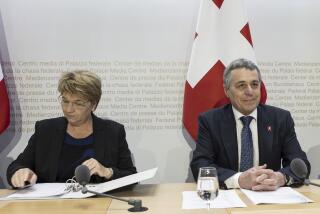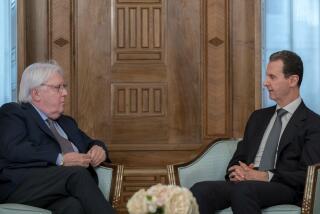Sudan agrees to inclusive peace talks
- Share via
TRIPOLI, LIBYA — In an international summit Sunday to push peace in Sudan’s troubled Darfur region, the Sudanese government agreed to soon meet rebel groups that thus far have refused to join peace talks.
If the agreement holds, it will be an important step in re-launching a peace process that has stalled since those key rebel factions rejected the widely unpopular Darfur peace agreement struck last year. The so-called non-signatories will meet the first week of August to prepare a unified position for talks with the government in late August or September.
“We’ve made a serious step forward,” said Jan Eliasson, the United Nations’ special envoy for Sudan. He and African Union representative Salim Ahmed Salim have devised a blueprint to whittle down competing peace proposals in order to have the government and multiple rebel factions discuss a single plan for peace in Darfur by the end of the summer.
After weeks of shuttle diplomacy, leaders from the five permanent members of the Security Council, the European Union, and neighboring and donor nations gathered in Tripoli, the Libyan capital, to endorse the move.
At issue is the four-year conflict between rebels and the government that international experts say has resulted in more than 200,000 deaths and the displacement of more than 2 million people. The government is accused of arming Arab militias, known as janjaweed, to attack civilians and rival tribes to crush the uprising.
Rival proposals
Before Sunday, Sudan’s neighbors, Eritrea and Libya, had been promoting peace initiatives that highlighted their own interests in the war-torn region, but the countries were persuaded to step back and let the U.N. and AU take the lead. The rival plans had given the government of Sudan a chance to play one against another, diplomats said.
“Now we are all going the same direction,” Eliasson said. “It’s like herding cats, but we did it.”
At the end of the first day of the two-day summit, they announced that they had achieved their main goals, but were still refining the wording of the agreement.
The rebel groups opposing the government had splintered into nearly a dozen factions with varying influence, making it difficult to conduct negotiations with Khartoum.
“What we need is the non-signatories to come to some sort of agreement,” said Elsamani Elwasila, Sudan’s minister of state for foreign affairs. “They have too many different leaders and changing demands.”
In a sign of solidarity, five factions said Saturday that they would unite and join the U.N.-sponsored peace process.
The new alliance, calling itself the United Front for Liberation and Development, came together during a meeting in the Eritrean capital, Asmara.
The groups said they had joined to present a united front for peace negotiations with Khartoum and appealed “to all other movements to unify efforts.”
But major groups, including the Sudan Liberation Movement and the Greater Sudan Liberation Movement, remain outside the new alliance.
Representatives from some of the outside groups were on the sidelines of the summit Sunday. They met with AU and U.N. officials but did not take part in the proceedings.
What’s on the table
Negotiators will tackle tough issues that include how much to compensate families driven from their land, how to protect them when they return and how to disarm roving militias.
“They need a political settlement,” said Andrew S. Natsios, the U.S. special envoy for Sudan, “and then we need peacekeepers. People are not going back to their villages unless there is security. “
Meanwhile, at the United Nations, the Security Council is debating a resolution authorizing a joint AU-U.N. peacekeeping force of up to 20,000 troops to help stabilize the region, which is the size of France. Sudan grudgingly agreed to accept the force after seven months of negotiations, on condition that it is nearly entirely made up of African soldiers and led by African commanders.
Elwasila, the Foreign Ministry official, said that the troops should not be allowed to use force, and that the Security Council should reward Sudan’s compliance by removing the threat of sanctions.
“It is high time now to send positive messages rather than threatening proposals,” he said. “We are not in a confrontation with the U.N.”
More to Read
Sign up for Essential California
The most important California stories and recommendations in your inbox every morning.
You may occasionally receive promotional content from the Los Angeles Times.













